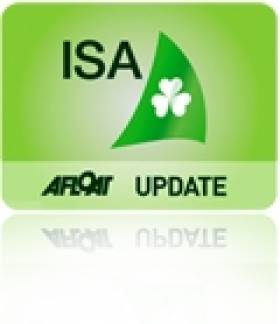Displaying items by tag: Bryan Armstrong
Just Who Do The Irish Sailing Association Think They Are?
#irishsailing – Ireland's national sailing authority has been going through turbulent times in recent years. With unprecedented expansion of ISA staff numbers as the country revelled in the boom years of the Celtic Tiger, the arrival of the inevitable and abrupt financial downturn found an Association bloated, unfit to cope, and out of touch with ordinary sailors.
High profile events, top level training and international participation had become so dominant in the ISA's range of activities that many of the ordinary sailors of Ireland already felt the Association was no longer relevant to their own low key personal pursuit of friendly sport afloat.
When the crash came, it led to a marked decrease in active sailing numbers as disposable incomes fell away. People focused on keeping their jobs and businesses afloat rather than their boats sailing, while many promising young sailors were forced to emigrate.
This new reality was reflected by the growing disillusion of club officers, who saw their membership subscriptions decreasing even while the ISA – which is largely reliant on subvention from the clubs for its own income – seemed always to be looking for more money. And at the height of the boom years, when all the major clubs had put through significant expenditure in developing their facilities to international standards, the ISA had shown its lack of contact with the reality of club life by proposing its own stand-alone National Sailing Centre in Galway, a facility which would in effect have been run in rivalry to the main clubs. To the mutterings in the grass roots were added the rumblings from above as major clubs threatened to withhold their annual payment to the ISA unless real reform was initiated. W M Nixon takes up the story.
In a classic grass roots revolution, club sailors Norman Lee from Greystones in County Wicklow and Bryan Armstrong from Sligo were at first rebuffed when they tried to voice their concerns about the ISA's increasing irrelevance to the needs of the vast majority of sailing enthusiasts, people at local level who were doing their very best to keep the sport alive through torrid times.
The Irish sailing community now owes these two men and their supporters a debt of gratitude, for they believed in what they were saying and they refused to be turned aside. Eventually, in November 2013 moves were in place to establish a Review Group for the urgent analysis of all ISA activities, and its personnel drew comprehensively on Ireland's remarkable pool of people with hands-on experience of running successful sailing events and organisations.
It was chaired by Brian Craig of Dun Laoghaire who has headed up the organising team on more major and notably successful international sailing events in Dublin Bay than probably anyone else, and its able personnel included two former ISA Presidents - Roger Bannon of Dun Laoghaire and Neil Murphy of Malahide and Howth - who had both been noted for their skill in running a tight ship when they were in charge. With them was highly regarded International Race Officer Jack Roy of Dun Laoghaire, and renowned sailmaker/activist Des McWilliam of Crosshaven, who each year is inevitably seen in busy involvement afloat in more Irish sailing centres - large and small - than anyone else in the boat world.
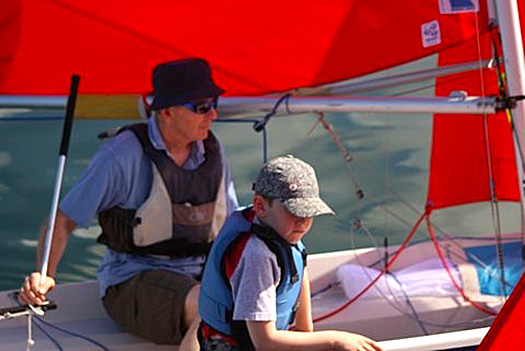
Bryan Amstrong of Sligo on the helm for a Mirror race
Also on board was one of the men from the barricades, Bryan Armstrong of Sligo. His background in a relatively remotely-located club which nevertheless has a long and distinguished sailing history made him uniquely qualified to voice the concerns of the grass roots. And we have to remember that all these people were giving voluntarily and generously of their time to this project in a period when Irish life was largely a matter of just getting through each day, while staying economically afloat was something of an achievement.
Primarily, the Review Group's function was to analyse the Association work on behalf of ordinary club sailors, as it was agreed that the Olympic and High Performance Divisions of the ISA's activities – which receive direct Sports Council grants – were in effect functioning as a different entity.
The Strategic Review Group was still work in progress when the ISA acquired a new President in David Lovegrove in March 2014, but by August the SRG published proposals which led to the setting up of a more formal body, the Planning Group. If this seems like a case of kicking the can down the road, it was anything but - these were people in a hurry, they'd got through the first stage of analysing areas where action was required, now they had to be more structured in coming up with clearcut ideas and concrete proposals.
This new Planning Group, which went into action in early Autumn 2014, was chaired by Neil Murphy, and its members included ISA President David Lovegrove, ISA Board Member Brian Craig, Ruth Ennis, Peter Redden, Sean Craig, and ISA CEO Harry Hermon, with noted Dun Laoghaire events administrator Ciara Dowling to provide administrative support.
They had their draft plan ready by mid-December 2014, and on January 21st 2015 Neil Murphy and his group publicly unveiled their analysis and proposals for the first time at a well-attended and very representative meeting in the Royal St George YC in Dun Laoghaire.
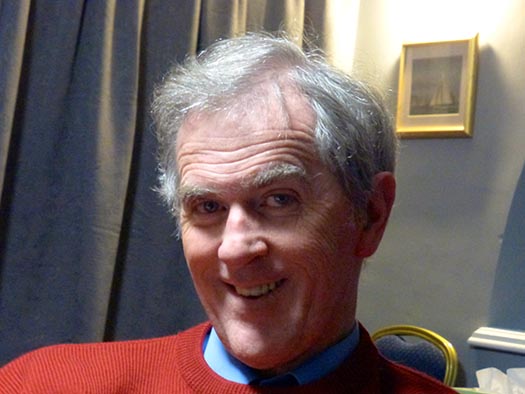 Neil Murphy is a former ISA President who, in addition to extensive experience as a Race Officer, is a typical club sailor, racing a Puppeteer 22 out of Howth. Photo: W M Nixon
Neil Murphy is a former ISA President who, in addition to extensive experience as a Race Officer, is a typical club sailor, racing a Puppeteer 22 out of Howth. Photo: W M Nixon
While those involved in setting the ISA on a healthier course are mostly working on a voluntary basis, it has to be said that the PowerPoint presentation and the printed material was of the highest professional class. In fact, it was much better than many professional shows I've been to, and the level of thought which went into a wide range of questions from the floor answered by Neil Murphy, Brian Craig and David Lovegrove generated a growing level of goodwill which concluded with Norman Lee voicing his congratulations and good wishes for this continuing process in which he and Bryan Armstrong had played such a key role.
So now we move on to the next stage – taking the ideas to the rest of the country. Doubtless you'll have noted the double meaning in titling this piece 'Just Who Do The ISA Think They Are?' In a first interpretation, that question is the one for which, let's hope, we are all now involved in working together in providing and implementing a satisfactory answer.
But equally, as the ISA Road Show gets out of Dublin to take this excellent presentation to a public meeting in Cork next week (it's in the Rochestown Park Hotel on Tuesday, Feb 17th, 7.0 pm to 9.0 pm) and then Galway the week after (Galway Bay Sailing Club, Tuesday 24th February 7.0 pm to 9.0pm), they'll be taking themselves into areas where experience of sailing administration long pre-dates the establishment of organised sailing on Dublin Bay.
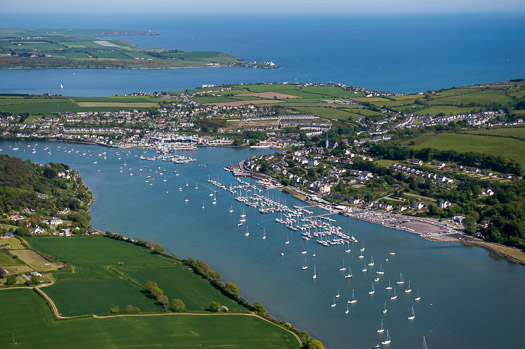 Crosshaven in the summer time. When we look at the natural advantages to be found here, it's little wonder that structured recreational sailing on Cork Harbour long-pre-dated any organised sport on Dublin Bay. Photo: Robert Bateman
Crosshaven in the summer time. When we look at the natural advantages to be found here, it's little wonder that structured recreational sailing on Cork Harbour long-pre-dated any organised sport on Dublin Bay. Photo: Robert Bateman
So you might well ask just just who do they think they are, these people from Dublin, going down to Cork to try to tell them how sailing should be organised? The nerve of them, doing it in a place where they've had organised sailing since 1720, and where the two biggest clubs – the Royal Cork and Kinsale – are both mighty establishments of international sailing repute which would remain so even were the ISA to disappear overnight in a puff of smoke...
And as for going west along the road to Galway, that will take them through Athlone where the Lough Ree Yacht Club dates back to 1770, while on the west coast the Royal Western of Ireland YC at Kilrush traces its origins back to 1828. Equally, further north along the Atlantic coast Sligo YC dates back to 1821, and in Lough Erne the club began in 1820. Yet the first club on Dublin Bay, the Royal Irish, only began as recently as 1831, and even then it barely hung in and had to be revived in 1846, with the pace being set in the meantime by the Royal St George YC, founded 1838.
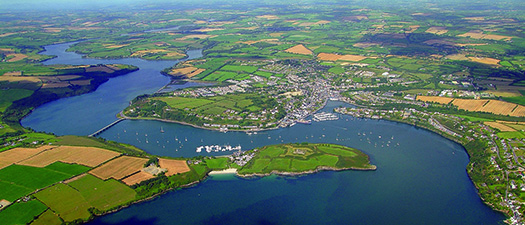
Kinsale is another harbour which seems to have been designed with sailing primarily in mind. Photo: Kevin Dwyer/courtesy ICC
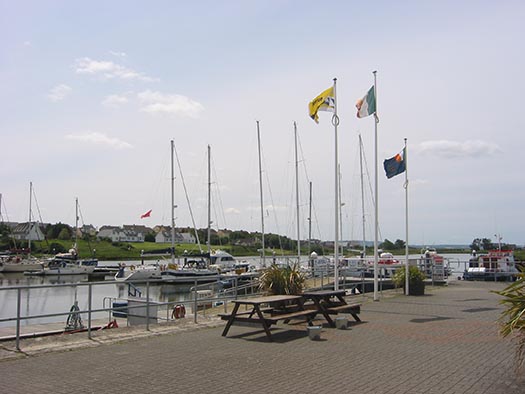
Kilrush on the Shannon Estuary had a club in being before there were any sailing institutions on Dublin Bay. Photo: W M Nixon
So in terms of sailing administration history, Dublin and Dun Laoghaire are only Johnny-come-lately places by comparison with just about everywhere else in Ireland. Yet thanks to the inevitable dominance of economic development, population growth and the strengthening centres of political power, we now find that sailing administration and decisions of national import are emanating from a place that, in terms of natural sailing advantages, lags far behind the rest of the country.
Oh for sure, Dun Laoghaire Harbour is a fabulous artificial amenity, and the advent of the new marina at Greystones has already been seized upon as greatly increasing the "cruising" options of Dublin Bay. But let's face it, Dublin Bay is really only good for racing, specific day sailing and training, whereas Cork Harbour and Kinsale provide such a variety of opportunities for interesting race courses, mini-cruises with multiple destinations and what have you, that in effect they're not just in a different part of the country – they're a different country altogether.

Dun Laoghaire is a totally artificial facility, and sailing options on Dublin Bay are limited. But it's inescapable that this is the primary point of leisure access to the sea for Ireland's largest and most affluent population. Photo: Kevin Dwyer/courtesy ICC
All of which adds to the difficulties of creating a meaningful national authority with which every sailing person can identify.
This business of Dublin v The Rest is not unique to sailing, of course, but when you have a specialist sport with multiple sub-branches of activity, the problem is exacerbated.
So please bear this in mind if you take yourself along to the meetings in Cork or Galway during the next ten days. This really is a genuine attempt to base the ISA within the sailing community at an everyday level of usefulness to all, with scope for growth while enhancing existing structures, and input from the sailing community at this stage will help in developing the ideas and initiatives proposed.
While the draft ISA Strategic Plan 2015-2020 very definitely puts the emphasis back on to the need for healthy well-run clubs as the basis for the sport, there was initially a feeling at the meeting on January 21st that the new-look ISA is not supportive of commercial sailing schools. In fact, what the new-look ISA hopes to do is encourage training schemes within clubs, while at the same time supporting commercial sailing schools where the demand is such that no club could realistically cope while maintaining its essential club ethos.
Going into this in more detail in a personal meeting this week with Neil Murphy, who is a Chartered Quantity Surveyor, we talked around the fact that a thriving club scene is central to the spirit of Irish sailing, and he was musing on the success of Sutton Dinghy Club where Hugh Gill heads up what is in effect a commercial sailing school within a club setting.
In fact, what Murphy would hope to see emerge at larger population centres is sailing's equivalent of the public golf course. Anyone who has used a public golf course will be aware that the proprietors are usually mustard keen to encourage the formation of a "club" within their customer base, and there is no reason why this shouldn't eventually take root in Irish sailing, providing access to sailing at a fraction of the cost of joining an established club.
It's not something which can realistically be objected to by established clubs trying to protect their own membership, as the people who would use a "public sailing club" would be those who simply couldn't afford to go sailing at all in the current traditional club setup.
Nevertheless support for the established club setup is central to the new Strategic Plan, and the provision of Regional Development Officers to serve clubs directly is very much to the fore in the new thinking. But in looking over the figures published with the report, it's good to note that the ISA works with no less than 80 recognised training centres, while an encouraging statistic is that there are now 24 secondary schools in Ireland which include sailing as a regular part of their curriculum. Admittedly it's a long way from the French setup where every schoolkid is entitled by law to one week of sailing and one week of skiing per year, but in a country where an aversion to being on the water used to be thought inevitable, it's a step in the right direction.
All these considerations of inexpensive sailing are a whole world away from the stories of recent weeks and days about the ISA's High Performance Division seeking a fund-raising executive who will be tasked with finding €2.75 million per annum through philanthropic and other donations in order to help the funding of top level campaigns which we're not allowed to call Olympic campaigns, as apparently that is copyrighted by the Olympic Council, so we call them High Performance instead.
But apparently Government departments aren't restricted by this limitation on the use of the word Olympic, for it was bandied about like nobody's business in this week's news that the government is spending mightily through the Sports Council, with sailing being number three in all Ireland in terms of current Sports Council funding, with a total tag of €1,289,900.
Of course it's not all for specifically Olympic sailing, but it covers 103 sailors from Optimists to the Olympics. Which is fine and dandy for those who are mad keen to race at the highest level, but most sailors in Ireland are much more interested in performing well within their chosen area and boat class, but with sailing being just part of a reasonably civilised and well-balanced life.
And as became evident at the meeting on January 21st, there's an increasing number of people who feel that sailing needs to realise that there's a sizeable population out there of folk who'd like to go sailing, but don't feel the almost religious vocation to own a boat.
With the rapid expansion of sunshine sailing holidays with boats and equipment readily available for hire at the destination, there's a strong feeling there's a real need for more of this in Ireland, even if we can't guarantee the sunshine. The suggestion brings us back to both the "public sailing club" concept, and the growing realisation by established clubs that they have to reach out to potential members by having boats available for sailing on a trial basis.
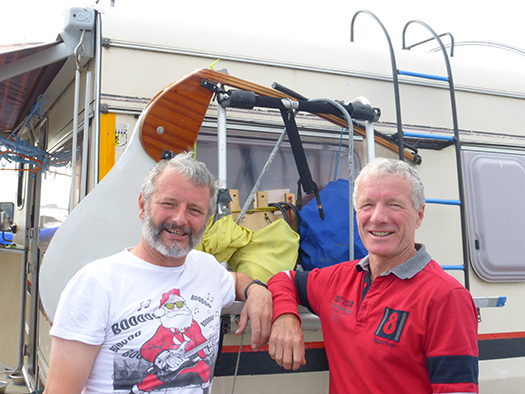
The Affordable Sailing Team – Norman Lee (right) with his brother Ken beside their campervan at last year's GP 14 Worlds at East Down YC on Strangford Lough. Photo: W M Nixon
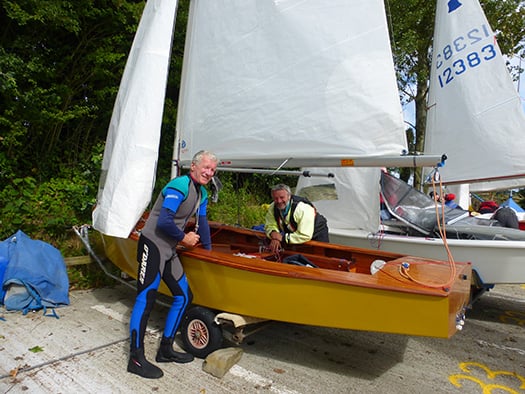
With their own very high can-do standards of boat maintenance, Norman and Ken Lee can keep their GP 14 in the competitive frame. Photo: W M Nixon
That said, the need to own one's own boat and tune and tinker with her to your heart's content is what sailing is all about for many of us, and Norman Lee is a classic case in point for this approach. He claims that his sailing costs him just €600 per year, though that of course is after he has paid for his well-tuned GP14, and he has long since written off the cost of the vintage camper-van which is home to the Lee Equipe when they hit the campaign trail.
Nevertheless the entire setup has to be outstandingly good value, and doing it in such economical style is part of the fun of it all. So when someone with Norman Lee's approach to sailing is prepared to get up at the big ISA public meeting in Dun Laoghaire and congratulate the team who have been working on the reforms which he and Bryan Armstrong set in train, then that is approval of a high order.
And as for just who or what is the ISA, can we maybe agree that ideally we all are the ISA, every last one of us who goes sailing or is even just interested in the sport, and it's up to us to keep it in line and encourage it to identify with and serve the ordinary sailor every bit as much as the high-flyer.
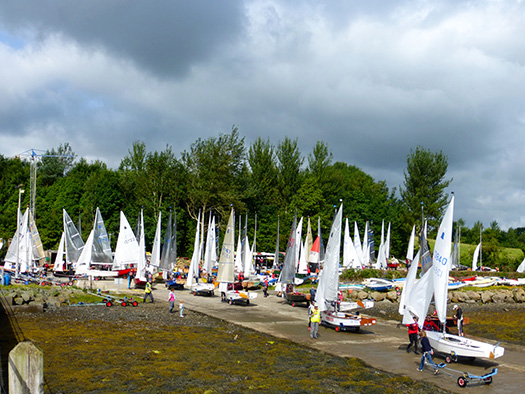
Private pleasure.....the 2014 GP 14 Worlds at East Down YC is about as high as many Irish sailors would expect or want to aim, and many are content with much lower-key regular club sailing. Photo: W M Nixon
'Independent Group' of Sailors to Form Future Irish Sailing Association Plan
#ISAPLAN – The Irish Sailing Association (ISA) is set for a shake–up following a year of controversy over its policies. Last night it was revealed an 'independent group' – that includes some of the association's critics – has been appointed to form a new plan for the governing body.
In framing the terms of reference for the 'Strategic Review Group' (SRG), ISA President Niamh McCutcheon conceded 'events have overtaken it and the ISA needs a new plan'.
A team of six leading sailors will 'establish the policies to be pursued and the actions required to deliver them successfully', according to SRG chairman Brian Craig, a former flag officer of the Royal St George Yacht Club in Dun Laoghaire.
Some long standing grievances aired last winter led to revolt when sailors Norman Lee and Bryan Armstrong criticised its dinghy and small boat training at the ISA agm. The points raised received widespread support that manifested itself months later in a vocal 'dinghy conference' for Ireland's 20 small boat classes at the National Yacht Club, resulting in over 300 suggestions for change.
It took perseverance and genuine courage to press for this change and there will be many sceptics and spoiling interests to confront if this first step is to translate into a new blueprint for sailing but in forming the new group, Craig has stressed its impartiality: 'As an independent group, we are ideally placed to seek suggestions".
We want to hear from anyone with a view to offer and I assure you that we will listen', he vowed.
Headquartered in Dun Laoghaire, the ISA has a staff of 14. Its accounts for 2012 show a turnover of €2m, much of it made up of government grants.
Significantly, Craig has included former ISA President Roger Bannon, an outspoken critic of current ISA policies in the line–up. A dinghy and sportsboat champion in his own right, Bannon used his term in office two decades ago to secure the position and financial viability of the association as a national sporting authority by making every member of a sailing club in Ireland also a member of the ISA.
It was a bravo move that unified Ireland's sailing clubs into a stronger whole fit to nurture the talent necessary to challenge the world at the top levels of sailing. But in more recent times that fitness has been called into question, and Bannon is among those who hit out at an authority that has arguably lost its relevance to all bar those at the most elite levels in the sport.
In a call for change on Afloat.ie last March, "The ISA has lost its way over the last few years," Bannon said, giving his view of a bureaucracy "detached from the reality of what is going on in the front line".
Craig has also asked another former president Neil Murphy, along with Olympic race officer Jack Roy, sailmaker Des McWilliam and small boat advocate Bryan Armstrong to join this Group, with the option to add others as the process continues.
Once it has carried out an 'initial examination' the group will move on to recommend 'future strategies'.
Spring 2014 is scheduled as completion date for the Group's assessment of the current position.
'This will be a major undertaking but I am confident that, with the support and engagement of all interested parties, we will chart a course for the Sport suited to this new environment.
It is understood the process will include a zero based budget review on key financial areas along with a review of the association's committee structures.
'The new plan will be critical to the association's ability to provide leadership in satisfying the aspirations of existing members and in attracting new participants to the sport', according to McCutcheon, the outgoing president due to step down in March.
The SRG has set up a dedicated email address and can be contacted by email through [email protected]
In a statement seen by Afloat.ie SRG Members are listed with the following bios as:
Bryan Armstrong lives at Rosses Point County Sligo. Keen if not overly successful dinghy sailor since the late 1960s with an interest in home boatbuilding in wood – Mirrors, GP14 and (for the 2011 Worlds in Sligo), a Fireball.
Committee member of Sligo Yacht Club several times over the years and Commodore 1978. Chaired organising group for 2006 GP14 Worlds in Sligo which was intrinsically linked with the construction of the new Sligo clubhouse. Always interested in junior sailing in Sligo and nationally. Committee member Irish Mirror Class Association 2004 to 2011 and President 2008 to 2010. Currently actively sailing a GP14. Practicing partner solicitor in a Sligo based firm. Bryan can be contacted at [email protected]
Roger Bannon, a member of the National Yacht Club, was President of the Irish Sailing Association when the Joint membership Scheme was established and the current Olympic /Elite model was devised in the mid 90's. He has always been a keen small boat sailor and has won multiple national titles in the 420, Mermaid, Flying Fifteen and J24 classes. He was the first Irish sailor to pioneer racing in the Olympic Star Class and more recently was one of the innovators in the establishment of the SB20 fleet in Ireland. He continues to have an active interest in the sport and still regularly sails his venerable 53 year old Mermaid "Endeavour" and when creaking bones allow, occasionally a J70 or a National 18. Roger can be contacted at [email protected]
Brian Craig, a former flag officer of the Royal St George, a member of the Irish Cruising Club, Lough Derg and Kinsale yacht clubs. Was a keen dinghy sailor competing on the Firefly, Fireball and Team Racing national and international circuits. Currently racing a SOD, he has a motor cruiser on Lough Derg and a cruising yacht based in Dun Laoghaire.
Since retiring from business, he has played a key role in attracting and organising major championships on Dublin Bay. He worked closely with the waterfront clubs and local bodies in Dun Laoghaire to develop the biennial Volvo Dun Laoghaire Regatta and more recently led the Irish team that ran the ISAF Youth Worlds 2012.
He was a recipient of the 2010 National Award to Volunteers in Irish Sport from the Irish Sports Council. Brian can be contacted at [email protected]
Des McWilliam (Royal Cork Yacht Club and Royal Irish Yacht Club)
A regular participant in Irish and international sailing. He is in constant contact with customers in dinghy and keelboat sailing - racing and cruising.
Des Sailed for Ireland: Admiral's Cup on five occasions, Sardinia Cup twice, the Southern Cross and 1/2 Ton Cup twice. He is the owner of McWilliam Sailmakers Ltd / UK Sailmakers Ireland and President of 50-loft UK Sailmakers International Group 2010-12. Co-owner UK Sailmakers International Group 2012-present and was a member of the Oireachtas Task Force on Small Business in mid '90's He was a guest lecturer in Entrepreneurship UCC late '90's and is still in business after five years of recession. Des can be contacted at [email protected]
Neil Murphy (Howth Yacht Club and Malahide Yacht Club)
Enterprise dinghies and Laser frostbiting (when wet suits were a novelty) were Neil's intro to the sport. Small boats are still his favourites and he races a Puppeteer 22 in Howth. As a National Race Officer, he gets to see and enjoy racing in a variety of Classes.
As one of the ISA's youngest Presidents (1996 to 1998), he launched its first Strategic Plan, which plotted priorities and set out its targets coming into the current millennium. He chaired the 2012 ISA review of the All Ireland (formerly Helmsmans) Championship and, most recently, was Race Officer when Howth YC hosted the 2013 event. Apart from racing, his main area of interest is in increasing participation levels, both by recruiting newcomers and retaining those already involved.
Neil can be contacted at [email protected]
Jack Roy (National Yacht Club, Royal Irish Yacht Club and Kinsale Yacht Club)
Started sailing Mirrors in 1967 from Greystones Sailing Club. Over the years he has raced in 420s, 470s, Flying Fifteens, J24s, Dragons, J109s and Squibs. He has also cruised for many years and currently keeps a cruising boat in Kinsale from where he sails the southwest coast and further afield. When Jack's not sailing he's very involved in race management and has been an International Race Officer since 1998. He was honoured to be the first Irish Race Officer at an Olympic Regatta in the London 2012 Games. Jack Roy is a cuurent board member of the ISA.
When not on the water, he is Managing Director of Fagerhult Irl Ltd, the Dublin office of a Swedish PLC specialising in energy efficient lighting solutions to the commercial sector
Jack can be contacted at [email protected]
For further reading:




























